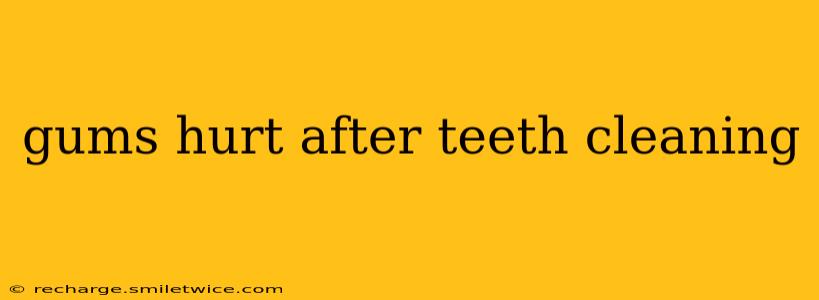Going to the dentist for a professional cleaning is crucial for maintaining good oral health. However, sometimes, a seemingly simple procedure can leave you with a lingering discomfort: sore gums. Many people experience gum soreness after a teeth cleaning, and understanding why this happens is the first step to managing it. This comprehensive guide will explore the common causes of post-cleaning gum sensitivity, offer effective remedies, and provide preventative measures to minimize future discomfort.
Why Do My Gums Hurt After a Teeth Cleaning?
The most common reason for gum soreness after a cleaning is the removal of plaque and tartar. These stubborn deposits irritate the gums, and the cleaning process, while beneficial, can temporarily increase this irritation. Think of it like scrubbing a sunburnt area—it's necessary for healing, but it might sting initially. The hygienist's tools, while meticulously used, can also cause minor trauma to the gum tissue.
Are my gums infected?
While post-cleaning soreness is usually temporary, persistent or severe pain could indicate a more serious underlying issue like gingivitis (gum inflammation) or periodontitis (gum disease). If your pain is accompanied by bleeding, swelling, or pus, you should contact your dentist immediately.
Is it normal for my gums to bleed after a cleaning?
Some bleeding during a cleaning is normal, especially if you have gingivitis. Healthy gums, however, shouldn't bleed excessively. If significant bleeding occurs, your dentist might recommend further examination and treatment.
How long should gum soreness last after a teeth cleaning?
Generally, gum soreness after a professional cleaning should subside within 24-48 hours. If the discomfort persists beyond a couple of days, or if it worsens, you should contact your dental professional.
What Can I Do to Relieve Gum Soreness?
Fortunately, several home remedies can help soothe your irritated gums:
-
Saltwater Rinse: Dissolve half a teaspoon of salt in a glass of warm water and rinse your mouth gently several times a day. Saltwater possesses natural antiseptic and anti-inflammatory properties.
-
Cold Compress: Applying a cold compress to your cheek can reduce swelling and numb the affected area, providing temporary relief.
-
Over-the-counter pain relievers: Ibuprofen or acetaminophen can help manage pain and inflammation. Always follow the recommended dosage on the packaging.
-
Avoid Irritants: Steer clear of acidic foods, hot beverages, and alcohol, as these can further irritate your sensitive gums. Stick to soft, bland foods for a couple of days.
-
Gentle Brushing: Use a soft-bristled toothbrush and brush gently to avoid further irritation.
What kind of toothpaste is best for sore gums?
Choose a toothpaste specifically formulated for sensitive gums. These often contain ingredients that help soothe and protect irritated tissue.
Preventing Gum Soreness After Teeth Cleaning
While some discomfort is sometimes unavoidable, you can take steps to minimize its likelihood:
-
Maintain excellent oral hygiene: Brush and floss regularly to prevent plaque buildup.
-
Schedule regular dental checkups: Preventative care is key to minimizing the need for extensive cleaning and reducing the risk of gum irritation.
-
Inform your dentist: Let your dentist or hygienist know about any existing gum sensitivity or concerns before your cleaning. They can adjust their technique accordingly.
-
Consider using a water flosser: Water flossers can be more gentle on gums than traditional floss, especially for those with sensitive gums.
Conclusion
Experiencing some gum soreness after a teeth cleaning is relatively common. Understanding the causes and employing appropriate remedies can significantly alleviate discomfort. Remember that persistent or severe pain warrants a visit to your dentist. By maintaining excellent oral hygiene and scheduling regular dental checkups, you can minimize the likelihood of future discomfort and maintain optimal oral health.
